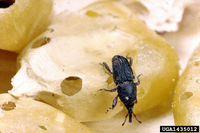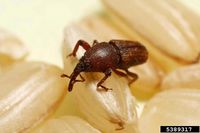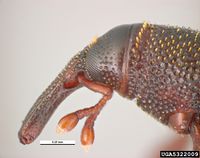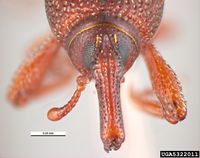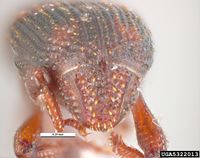Difference between revisions of "Sitophilus oryzae"
| (One intermediate revision by the same user not shown) | |||
| Line 1: | Line 1: | ||
{{TaxLinks|LnkSitophilus}} | {{TaxLinks|LnkSitophilus}} | ||
| − | {{ | + | {{LiteratureDBX|{{PAGENAME}}|222|browse,Ccountrylnk,Pproducts,AbenefialsN}} |
| − | [[File:Sitophilus_oryzae_IPM5205059.jpg| | + | [[File:Sitophilus_oryzae_IPM5205059.jpg|200px|thumb|''Sitophilus oryzae'' (click on image to enlarge it)<br/>Author(s): Natasha Wright, Florida Department of Agriculture and Consumer Services<br/>Source: [http://www.ipmimages.org/browse/detail.cfm?imgnum=5205059 IPM IMAGES]]] |
| − | <font color="#800000">'''''Sitophilus oryzae'''''</font> (Linnaeus) - (rice weevil) | + | <font color="#800000">'''''Sitophilus oryzae'''''</font> (Linnaeus, 1763) - (rice weevil) |
The species is a serious pest of stored grain with a world-wide distribution. It may also infest other products like stored cassava. The weevil is found in the field in tropical countries only, but is frequently imported into temperate regions with rice shipments. The larvae develop inside the grain and development from eggs to adult lasts around 4-6 weeks under suitable conditions. Control is done by fumigation or controlled atmosphere (low oxygen and high carbon dioxide). | The species is a serious pest of stored grain with a world-wide distribution. It may also infest other products like stored cassava. The weevil is found in the field in tropical countries only, but is frequently imported into temperate regions with rice shipments. The larvae develop inside the grain and development from eggs to adult lasts around 4-6 weeks under suitable conditions. Control is done by fumigation or controlled atmosphere (low oxygen and high carbon dioxide). | ||
| + | |||
| + | The adult is 2 - 3.5 mm long, dark reddish brown, often with 4 reddish spots on the elytra. It closely resembles ''[[Sitophilus zeamais]]'', but is usually slightly smaller and has several distinguishing characters, like the punctures on the pronotum being oval in shape rather than round. | ||
{{VN | {{VN | ||
|en=rice weevil | |en=rice weevil | ||
| Line 12: | Line 14: | ||
|pt=gorgulho-do-milho<br/>gorgulho-do-arroz | |pt=gorgulho-do-milho<br/>gorgulho-do-arroz | ||
}} | }} | ||
| − | |||
'''Synonyms:'''<br/> | '''Synonyms:'''<br/> | ||
| Line 18: | Line 19: | ||
''Sitophilus sasakii'' | ''Sitophilus sasakii'' | ||
| − | + | ||
| + | |||
| + | |||
| + | |||
<gallery widths=200px caption="Other images of Sitophilus oryzae (IPM Images - click to enlarge)"> | <gallery widths=200px caption="Other images of Sitophilus oryzae (IPM Images - click to enlarge)"> | ||
Latest revision as of 20:43, 31 March 2022
| Literature database |
|---|
| 327 articles sorted by: |
| • year (descending) |
| • research topics |
| • countries/regions |
| • products infested |
| • list of natural enemies |
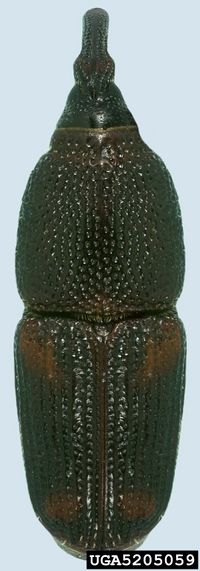
Author(s): Natasha Wright, Florida Department of Agriculture and Consumer Services
Source: IPM IMAGES
Sitophilus oryzae (Linnaeus, 1763) - (rice weevil)
The species is a serious pest of stored grain with a world-wide distribution. It may also infest other products like stored cassava. The weevil is found in the field in tropical countries only, but is frequently imported into temperate regions with rice shipments. The larvae develop inside the grain and development from eggs to adult lasts around 4-6 weeks under suitable conditions. Control is done by fumigation or controlled atmosphere (low oxygen and high carbon dioxide).
The adult is 2 - 3.5 mm long, dark reddish brown, often with 4 reddish spots on the elytra. It closely resembles Sitophilus zeamais, but is usually slightly smaller and has several distinguishing characters, like the punctures on the pronotum being oval in shape rather than round.
| Vernacular names | |
|---|---|
| • Deutsch: | Reiskäfer |
| • English: | rice weevil |
| • Español: | gorgojo del arroz |
| • Français: | charançon du riz calandre du riz |
| • Português: | gorgulho-do-milho gorgulho-do-arroz |
Synonyms:
Calandra oryzae
Sitophilus sasakii
- Other images of Sitophilus oryzae (IPM Images - click to enlarge)

